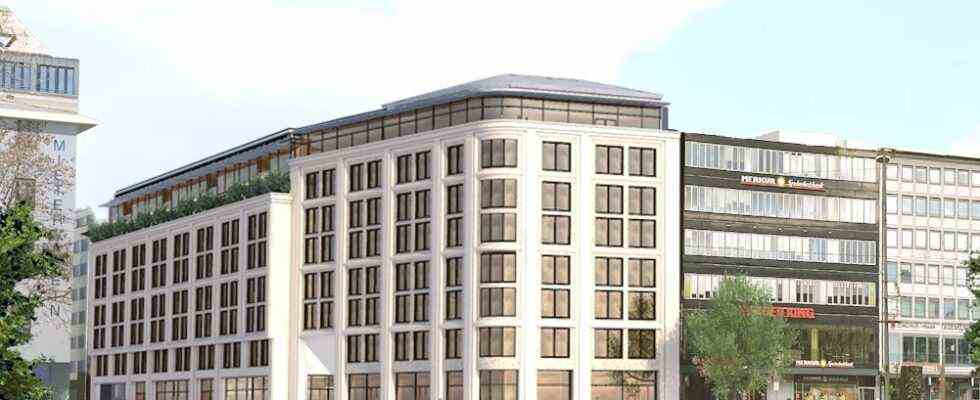Better, but by no means good: This is the tenor of the urban planning commission’s judgment on the architecture of a planned new hotel on the corner of Schwanthalerstrasse and Sonnenstrasse. “You have implemented some of the information that was mentioned at the first presentation,” said Commissioner Ruth Berktold, architect from Munich and professor at the Munich University of Applied Sciences (HM). As early as July, the project was a topic in the commission that advises the city council and administration on important construction projects. A main point of criticism at the time was that two storeys were combined into one on the facade, which the commission found completely inappropriate. She requested a revision of the project. Now every floor can be recognized as such on the facade. “But,” noted Berktold, “the facade is still very historicizing in the overall ensemble of Sonnenstrasse”.
The architect Carlos Maltzan, commissioned by the client Harry Habermann, derives his facade concept from the historical development on Sonnenstrasse, which has not existed since it was destroyed in the Second World War. The Berlin architect Matthias Sauerbruch was bothered by this in the discussion of the commission on Tuesday evening: He emphasized the strong effect of the surrounding buildings from the 1950s – which so far also includes the current development of the property, which has to give way for the new hotel and thus also the Technoclub “Harry Klein”, which has its home there. “What history is the project about?” Asked Sauerbruch. “Is it an answer to the neighbors or a fantasy classicism?” Sauerbruch judged the concept at hand “in one of the most important urban spaces in Munich” to be “out of place”.
With this concept, the architect and client first appeared on the urban planning committee and failed.
(Photo: Construction Planning Graf Maltzan)
Maltzan had previously thanked in his presentation for the “many suggestions” at the first discussion in the town planning committee and emphasized that they had been taken up and thus “the planning was improved”. This also includes a more restrained attic and more greenery in the inner courtyard. He is “convinced that it is a restrained architecture that blends in well”. Maltzan also emphasized that architectural quality is a particular concern of the client. Because Habermann, who has already realized many real estate projects in Munich, wants to keep the hotel, which should have a good 270 rooms, in his family’s holdings for the long term. The Amano hotel group already operates a house on Sendlinger Strasse called Mio, Habermann said in the summer.
Karin Schmid, also HM professor of architecture, brought up another aspect in the discussion: She would like the facade to be of the highest quality possible and not simply clad with the standard thermal insulation that is often used. Perhaps in due time the client will show how the facade should look with a sample, “if he is approaching his plans so demanding,” suggested Schmid. She could “imagine that”, said City Planning Councilor Elisabeth Merk. Maltzan then announced a sampling: “I hope that we can then convince a few more.”
It will be difficult for the Green City Councilor Anna Hanusch, who heads the city planning commission. “It’s definitely not going to be a favorite project of mine,” she said. There are “time and again projects in the Commission where we would like a fundamentally different approach to the place. But we also come up against limits”.
The word of the commission is important in the procedure for a building permit, the revision has also led to a “significant improvement”, as Hanusch summarized the judgment. But the Commission cannot veto. Ultimately, it is the client’s sovereignty to implement architectural planning if it is legally permissible, which in this case is undisputed. Therefore, Habermann and Maltzan can now assume that they will get the approval soon. “We welcome the fact that the urban planning committee has appreciated our revision and received it positively,” said Maltzan after the committee meeting.

